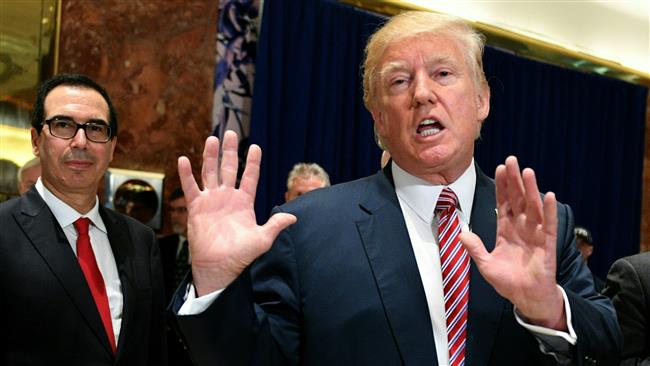
RNA - Upon his assumption of office in late January, the US President Donald Trump issued an executive order on foreign travels to the US, banning citizens from seven Muslim-majority countries from entry to the US. The ban was deemed highly irrational and discriminatory, and drew the American citizens' protests that pushed temporary suspension of the controversial order at the hand of Seattle Judge James Robart.
The Saturday September 24 marked expiration of the three-month ban period, but the White House extended the travelling restrictions for the already-on-the-list countries, excluding Sudan whose name was dropped from the list, and added three other countries of Chad, North Korea, and Venezuela.
Trump since the presidential campaign has been maneuvering on the immigration rules and instrumental use of them to put strains on the Muslims. Before his election as a president, Trump several times pledged to disallow entry of the Muslims to the US soil. On the other hand, pressuring the independent countries and those against the American unilateralism around the world using choices at the White House disposal has continuously been an integral part of Washington foreign policy.
Accordingly, the citizens from the opponent countries are exposed to constant restrictions and punitive measures. On the opposite side stand the nationals of the pro-American countries who do measures proven risky to the American and global peace and stability but are ignored by the restrictive American policies. This policy is glaringly apparent in the new American immigration law. Studying the veracity of the American accusations against the affected countries come out with a result assertive in exhibition of the politicized and biased US objectives behind the ban.
The charge of supporting the terrorism is the main American justification to put name of some countries on the travel ban list. The list is filled with the names of some countries while other countries' names that have a long record in pro-terror actions and promotion of terrorism are missing on the list. The clear examples are Saudi Arabia and Pakistan. Certainly, so far the biggest terrorist attacks carried out inside the US are the 9/11 attacks. All of the attackers were identified to be Pakistani and Saudi Arabian nationals, but Saudi Arabia and Pakistan were not covered by the travel ban as part of new Trump immigration law. According to an 800-page Congress report on the September 11, 2001 attacks in the US, Saudi Arabia and the Wahhabi organizations played a key role in orchestration of the attacks.
Riyadh funds Salafi and Wahhabi schools in the Indian Peninsula, Africa, and even Europe and thus effectively helps propagation of terrorist and takfiri ideology in these regions of the world. But Washington does not bother attempting to counter spread of extremist ideology.
Additionally, for over a decade and through backing the terror networks, Pakistan has been meddling in the Afghanistan’s war that was waged by the US over a decade ago. The massive Islamabad supports go mainly to Taliban, the strongest terrorist group active in vast swaths of Afghanistan. The American officials every now and then tacitly blast the Pakistani government's stance on Afghanistan, but they never cut their support to the Islamabad government or most importantly to the army.
Another example of American double-standard approach noticeable in the new immigration law is related to Sudan. Sudan was included in the initial version of the travel ban issued in March, but recently extended list has seen Sudan named eliminated. Khartoum government joined the war on Yemen waged by Saudi Arabia, the most strategic ally of the US in the region, under the excuse of “protecting the holy sites”, meaning the holy Muslim sites in Mecca and Medina. The intervention in Yemen by Sudan prompted deployment of hundreds of troops now fighting against the Yemeni people. Sudan, moreover, closed its embassy in Iran after announcing severing diplomatic ties with Tehran. By taking these measures, Khartoum fully joined the Saudi-led camp. The White House maintained that removing Sudan from the expanded travel restriction list could stand prelude to lifting many other sanctions imposed on this country.
The reviewed list now has Venezuela and North Korea, too. Earlier, the US announced fresh sanctions on Venezuela. Trump, at a dinner with the Latin American leaders on the fringes of the United Nations General Assembly last week, said: “the situation in Venezuela is completely unacceptable.” He warned that Washington was ready to even tighten the noose on Caracas by additional measures amid unfolding crisis in the Latin American country. The government of President Nicolas Maduro has been a key unifier of the Latin American leaders antipathetic to the American intervention in their countries' internal affairs. This provides Washington with motivation to seek ousting Maduro through doubled pressures on Caracas which has been scene to opposition groups' anti-government protests.
North Korea has not so far organized terrorist attacks against the US. Many analysts hold the idea that labeling Pyongyang as a pro-terror party stems from the American interventionist policy in the Far East and the North's nuclear deterrence.
The US foreign apparatus draws on a set of options such as unilateral laws, exploitation of human rights principles, massive media propaganda, and economic sanctions to deal with its opponents. Washington struggles to save allies like Pakistan and Saudi Arabia, and this is why the US turns blind eye despite the knowledge of these two countries' backing for the terrorist groups.
The US administration announced the new immigration law was open to revision, making it clear that there are no stable standards governing the law, which serves as a tool to press independent and non-compliant countries.
Source: Alwaght
847/940